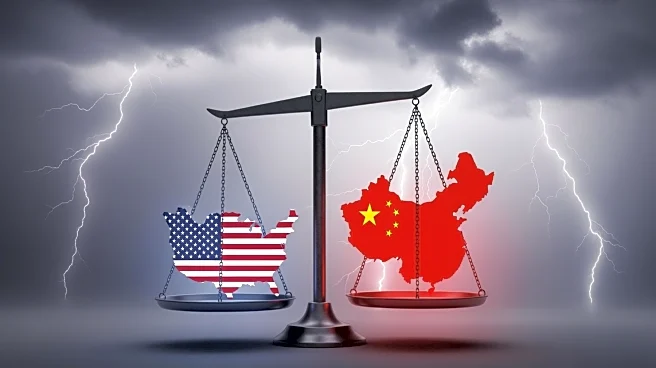What's Happening?
President Trump has announced plans to impose tariffs starting at 130% on Chinese exports by November 1, escalating trade tensions between the United States and China. This move follows a period of reduced tariffs after a temporary truce earlier this
year. The renewed tensions were sparked by China's decision to restrict exports of rare-earth minerals, which are crucial for electronics production. In response, Trump has also threatened export controls on critical software to China. Despite these developments, Trump expressed optimism about resolving the issues amicably, indicating plans to meet with Chinese President Xi Jinping at the Asia-Pacific Economic Cooperation summit in South Korea. U.S. Treasury Secretary Scott Bessent noted that recent negotiations have seen some de-escalation, although the situation remains volatile.
Why It's Important?
The escalation in trade tensions between the U.S. and China could have significant implications for global markets and industries reliant on rare-earth minerals. These minerals are essential for manufacturing electronics, and China's restrictions could disrupt supply chains, affecting companies worldwide. The proposed tariffs by the U.S. could lead to increased costs for American consumers and businesses, potentially slowing economic growth. Additionally, the geopolitical implications of these tensions could strain diplomatic relations and impact international trade policies. Both nations stand to lose economically if the situation is not resolved, highlighting the importance of diplomatic negotiations.
What's Next?
President Trump and Chinese President Xi Jinping are expected to meet at the upcoming Asia-Pacific Economic Cooperation summit, which could provide an opportunity for direct negotiations. The outcome of this meeting could determine the future of trade relations between the two countries. Stakeholders, including businesses and political leaders, will be closely monitoring the situation, as further escalation could lead to retaliatory measures from China. The international community may also play a role in mediating the conflict to prevent further economic disruption.
Beyond the Headlines
The trade tensions between the U.S. and China underscore the strategic importance of rare-earth minerals in global technology and defense industries. The restrictions imposed by China highlight the country's leverage in controlling these critical resources, which could lead to long-term shifts in global supply chains. Additionally, the situation raises ethical and legal questions about the use of trade policies as tools for geopolitical influence, potentially setting precedents for future international trade disputes.















